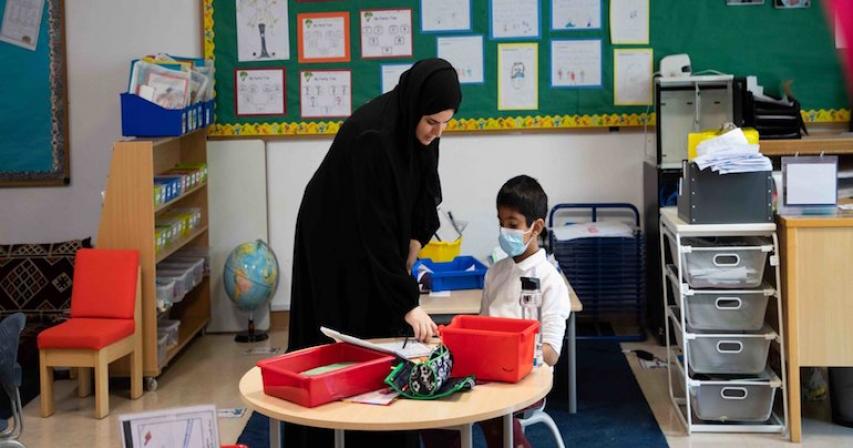We are used to Qatar addressing issues in almost every field with seriousness, professionalism, and depth, so it is little surprise that it so actively promotes and supports the Arabic language in a time when this language is suffering in a number of countries where it is natively spoken. This commitment by Qatar is not about slogans and rhetoric, but is instead illustrated in its laws, projects, and goals to restore the position and splendor of the language of the Holy Qur’an.
This reflects Qatar’s ceaseless efforts to preserve the heritage of Muslims, which astounded the world through the Arabic language that the world has been learning for centuries
And it is also an honor for Qatar to strengthen the position of the Arabic language, which served as a carrier of civilization, and of Islamic sharia and culture. As the Commander of the Faithful, Omar Ibn Al-Khattab, said: “Learn Arabic, for it is from your religion.” The Arabic language preserves the unity of Arab and Islamic nations; Imam Al-Shafiʽi said: "People did not become ignorant or in dispute except for abandoning the Arabic tongue."
At the legislative level, Qatar issued a law to protect the Arabic language and penalize those who violate it. It supports the use of the Arabic language in all activities and events, while obliging ministries, institutions, and entities to use it as the main language in their meetings; formulate the state’s legislations in Arabic; and ensures it is the language used in official dialogue, negotiations, and correspondence with other governments and organizations, as well as at conferences. Arabic is also the language of Qatar’s public educational institutions, and is taught as an essential subject in the curricula of private educational institutions.
Qatar launched the Doha Historical Dictionary of Arabic two years ago, with 2,000 years of Arabic language heritage being contained within a website. The final product includes a ‘memory’ of each word in the Arabic language, recording the date it was first heard and its first connotation, the history of its structural and semantic transformations, and how it was used in the different phases of its development. It also documents that ‘memory’ in texts that attest to the validity of the information it contains, based on a huge linguistic code that includes the majority of what Arabic works are composed of.
Meanwhile, in 2020 Qatar Foundation and TED have launched a two-year joint initiative called TEDinArabic, a global platform that attracts thinkers, researchers, artists and change-makers in the Arabic-speaking world. TED in Arabic reflects Qatar Foundation’s commitment to preserving, enhancing and promoting the Arabic language, and providing open platforms to all members of society so that they can share their knowledge, experiences, and ideas with a wider audience.
This partnership with TED will devote a digital platform that contains a library rich in topics of interest to the Arabic-speaking world, including the content for this initiative, original TED conference content as well as the translated content, blog articles, videos and lessons, and other content.
The impact of TEDinArabic is expected to continue after the end of the partnership period, with its website remaining available and accessible online, as a source of content to stimulate the imagination of individuals in Arabic-speaking societies and enable them to share their thoughts.
Qatar University has also contributed to efforts to preserve and promote the Arabic language through its Arabic for Non-Native Speakers Center, which grants certificates of competency to students whose native language is not Arabic. Since its inauguration, the center has become a key platform for achieving the university’s goals in spreading the use of the Arabic language, building bridges of scientific and cultural communication between Qatar University and other academic institutions, and opening new horizons for cooperation with its counterparts from regional and international universities.
And when Qatar impressed the Arabic and even international media by launching the Al Jazeera channel nearly a quarter of a century ago, raising the bar of freedom of expression, this step also contributed to strengthening communication between Arabic speakers through a sound and understandable Arabic language that transcends dialects.
On an educational level, Qatar continues to cultivate a love for the Arabic language in the hearts of children at an early age. Qatar Foundation produced the educational series Siraj, an integrated, 3D edutainment TV program that aims to communicate the Arabic language in a way that is friendly to children.
There is no doubt that Qatar wishes for all Islamic and Arabic-speaking countries to play their part in reviving and restoring the global status of the Arabic language, so it can once again lead Islamic civilization.
It is hoped that these countries will strengthen the language of their religion, so that it transcends and prevails. As the miracle of Arabic literature, Mustafa Sadiq al-Rafi’I, said “No nation whose language was humiliated can be saved from humiliation; no people whose language deteriorates can ever rise up again.”

Comments